Solo camping is an outstanding experience – you get to do what you want, when you want, without having to worry about anyone else.
But heading out to the wild alone can be special and challenging at once. Solo camping inherently comes with new adventures and learnings about yourself.
Whether you’re a pro camper or just preparing for the first solo camping trip, we’ve picked up some useful tips that will help make your next solo trip a success.
Benefits of solo camping
As the name implies, solo camping is all about solitude that a group camping simply can’t have. And, believe us, even if sharing stories around the fire is not part of the plan, the value solo camping adventure can bring you is enormous.
You can enjoy the moment
Bonding with the people in the group takes a lot of energy. One of the best things about solo camping is that there is just you! You’re completely alone with your thoughts, which makes an excellent opportunity to introspect and connect with nature in a way you may not have been able to before. Without any distractions.
You might realize that you appreciate your natural setting even more when you’re alone.
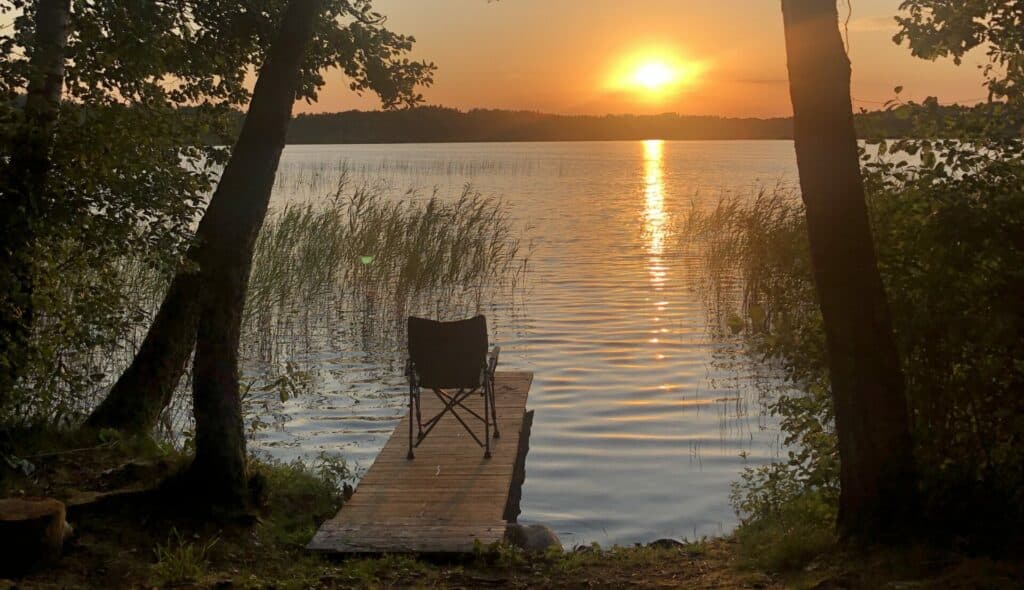
You can do everything at your own pace
People tend to have expectations about how fast and how far you’ll go. When you camp solo, you don’t have to worry about coordinating with anyone else – sleep in the fresh air, go for a day hike, take naps whenever you want, and stay up late stargazing under the night sky without worrying about waking anyone up.
You’re responsible for your own
When camping with friends, there are always people who tend to do more work than others. Pitching tents on their own, starting a campfire, and organizing a campsite.
Camping solo, on the other hand, leaves all the responsibilities to you, this way pushing you out of the comfort zone and forcing you to learn things you wouldn’t have thought of before.
It gives you a whole new sense of accomplishment – watching the sunset from the campsite you’ve prepared for yourself just hits differently.
Top tips for your solo camping trip
Now that we’ve gone over some of the benefits of solo camping, let’s get into practical tips for making your solo camping trip a success.
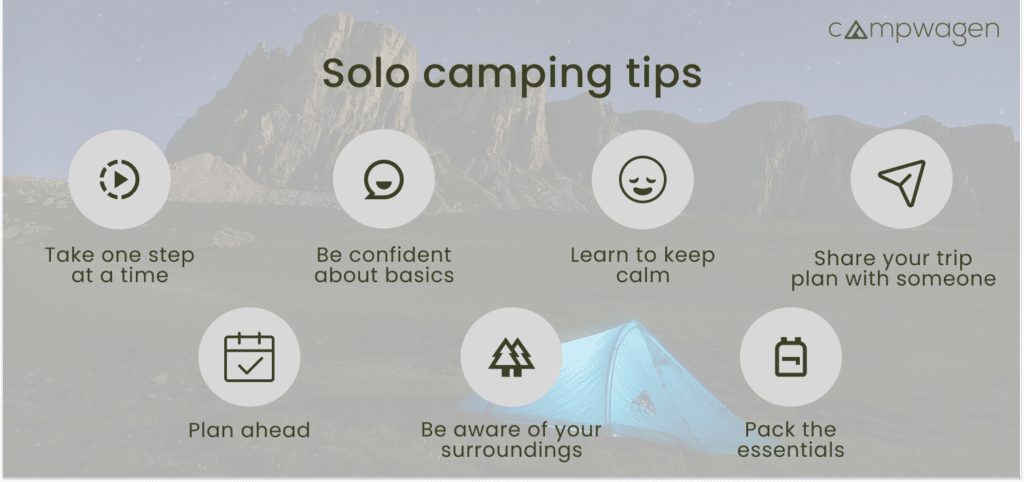
1. Climb the camping ladder, one step at a time
Many choose to camp solo for the first time because they want to challenge themselves. But, as with anything else in life, it’s important to start small and work your way up. If you’ve never been camping before, don’t try to go straight into the deep wilderness – that’s a recipe for disaster.
Start by doing some easier camping trips solo – car camping or backpacking in places where there are other people around is a great way to get started. Like so, if something goes wrong, you’re not too far from help.
Once you’ve built up your skills and confidence, then you can start thinking about heading out into more remote areas.
2. Be confident about basics
Knowing the basics and evaluating your camping skills before a solo camping trip is a must. Before camping alone, make sure you know how to:
- Navigate in the woods
- Pitch a tent
- Start a fire
- Set up camp
- Clean water in case you run out of supplies
- Deal with injuries
- Handle run-ins by wild animals
- Forecast weather
If you’re nodding your head in each of the above lines, you’re off to start your solo camping adventure!
3. Learn to keep calm
Paying attention to your surroundings is crucial, but it’s also important not to let your imagination run wild. If you’re constantly jumping at every noise, you’re going to exhaust yourself – and probably won’t enjoy the trip very much.
Try to keep things in perspective – if you hear a noise in the middle of the night, it’s probably just a wind moving around the leaves. It’s unlikely that a serial bear is lurking in the bushes.
As long as you’re prepared and have taken basic camping safety precautions, you’ll be fine (and we’ve all had that not-so-pleasant first night camping solo).
4. Plan ahead
Before heading out on your trip, do your research and plan ahead as much as possible. This means picking a safe campsite, mapping out your route, and packing all the gear and supplies you’ll need. Don’t forget to keep an eye on the weather forecast!
5. Share your trip plan with someone
Before heading out on your trip, leave a detailed trip plan for a friend or family member. This should include your planned route, campsite information, and expected return date. Knowing someone can quickly help is a huge relief if something goes wrong.
6. Be aware of your surroundings
One of the most important things to do when solo camping is to be aware of your surroundings at all times. This means being aware of the wildlife in the area and knowing what to do if you encounter an animal.
7. Pack the essentials
When packing for your trip, bring all the essential items you’ll need, such as a tent, sleeping bag, food, water, and a first-aid kit. And that’s not it! Let’s jump straight into the checklist.
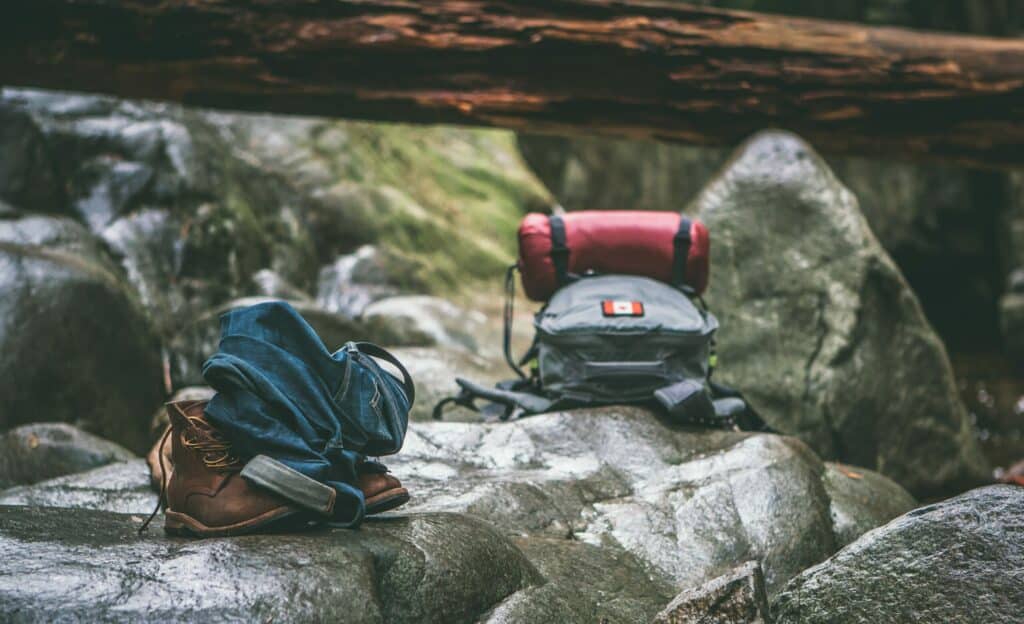
Essentials to-bring checklist
Now that we’ve gone over some tips for solo camping, let’s take a look at some of the essential items you’ll need to bring on your trip.
- Tent or hammock
- Roll mat, sleeping bag, pillow
- First-aid kit (must include items such as bandages, pain relief medication, and antiseptic cream)
- Headlamp
- Weather-appropriate clothes (day-wear, night-wear, sleepwear, cold weather)
- Multi-tool knife
- Matches, lighter, and fire starter (for easier fire stoking)
- Firewood
- Reusable campfire cooking travel kit
- Portable propane burner
- Eco toiletries
- Entertainment items (a good book is always a great choice)
Safety essentials
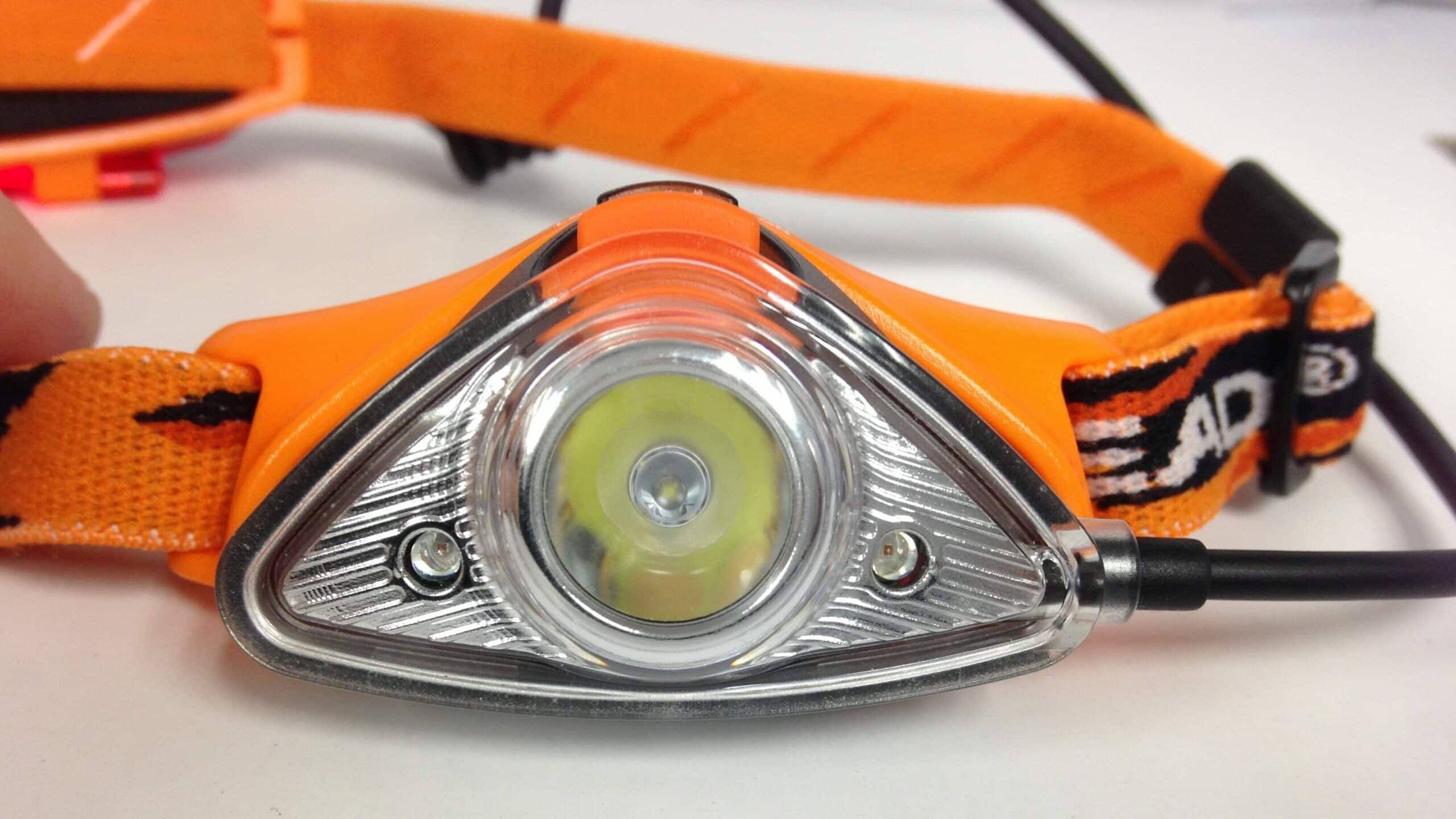
Camping alone doesn’t necessarily mean camping lonely – after all, you’re stepping into the wilderness. These are some safety devices that’ll help you feel safe:
- Air horn. Use this to scare away potential predators or signal for help in an emergency.
- Axe. A great tool for chopping wood and self-defense.
- Bear spray. Keep it with you at all times when camping in areas with bears.
- Flashlight or headlamp. Important for seeing at night and in dark caves or tunnels.
One more important safety tip is to make noise while simply walking around your campsite. This will help to scare away any potential predators.
Food and drinks for solo camping
When packing for food, it’s important to think about what will fuel you during long hikes, as well as what you fancy eating at the end of a tiring day. Here are some ideas:
- High-energy snacks such as nuts and dried fruit
- Chocolate – because solo camping is stressful sometimes, and you deserve it
- Trail mix – make your own with a combination of cereals, nuts, and dried fruit
- Jerky or beef sticks – these are great high-protein snacks
- MREs – if you don’t fancy cooking, Meal Ready to Eat packets can be heated up with water
- Easy to cook meals such as pasta, rice, or couscous
- Canned goods such as soup, beans, or tuna
- Spices – to add some flavor to your meals
- Campfire breakfast items such as cereal, oatmeal, or granola bars
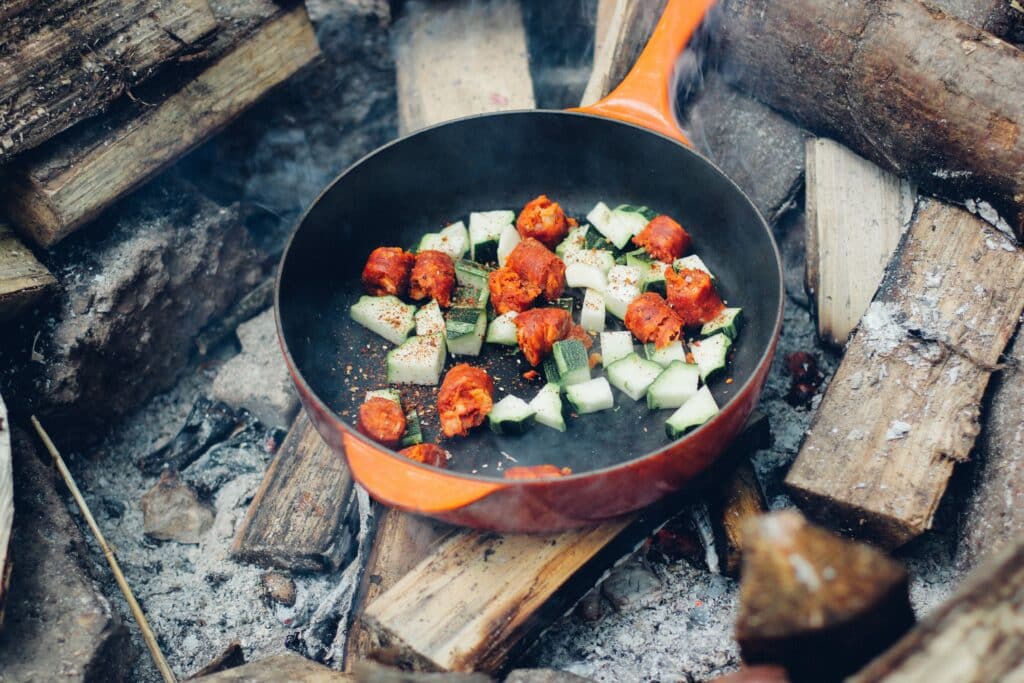
When it comes to drinks, water is, of course, the most important. Make sure you have enough to last you the whole trip, plus a little extra in case of emergencies. Other drinks to pack include:
- Coffee or tea – for those mornings when you need an extra energy boost
- Sports drinks – to keep you hydrated during long hikes
- Hot chocolate – because camping is not complete without it
So, is solo camping worth it?
Now that we’ve gone over all the solo camping tips and essentials, it’s time to decide – will you give it a try?
As you’ve learned, solo camping can be a great way to connect with nature while detaching from the hustle and bustle of everyday life. It’s also an excellent opportunity to test your survival skills and learn more about yourself.
If you’re feeling adventurous, why not give it a go? You might surprise yourself with how much you enjoy it. Happy solo camping!